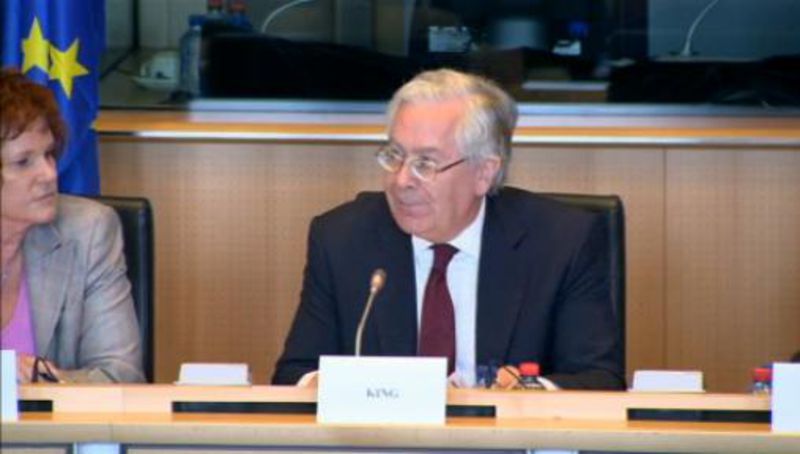The European Monetary Fund: and justice for all
Ralitsa Kovacheva, March 10, 2010
 Is there justice in solidarity: this, almost philosophical question, was painfully raised by the financial crisis. As the protests in Greece showed and the referendum in Iceland, two of the worst hit by the crisis states, people firmly showed they did not accept to pay private debts with public money. On the other hand, the stronger states are not very keen on helping weaker nations, although they realise the possibility that a failure will them directly. A typical example for this is Greece, whose bankruptcy could endanger directly the very existence of the eurozone.
Is there justice in solidarity: this, almost philosophical question, was painfully raised by the financial crisis. As the protests in Greece showed and the referendum in Iceland, two of the worst hit by the crisis states, people firmly showed they did not accept to pay private debts with public money. On the other hand, the stronger states are not very keen on helping weaker nations, although they realise the possibility that a failure will them directly. A typical example for this is Greece, whose bankruptcy could endanger directly the very existence of the eurozone.
So, is there a way solidarity in these two aspects, to be again legitimized? According to the economists Daniel Gros and Thomas Mayer from the Centre for European Policy Studies, the solution is a European Monetary Fund.
If we go back to the Greek example, in such a situation a country like Germany is on the losing side in all cases, the economists explain. If Berlin would agree on a bailout plan for Greece, this would jeopardize its public finances. If it wouldn't, its financial institutions would face significant losses from a possible bankruptcy of Greece. And, given the weak condition of the German banking system, this would either way deteriorate its public finances.
This situation could have been avoided if there was an institution like a European Monetary Fund. On the one hand it should guarantee that if there is a risk of a default of a country, this would not endanger the entire Community. And, on the other - the funding principle would be both joint and fair.
According to Gros and Mayer, the Fund should be financed only by countries  which will benefit from it, i.e. those eurozone members which do not cover the Maastricht criteria. The contribution rates must be 1 per cent the stock of ‘excess debt’, which is defined as the difference between the actual level of public debt (at the end of the previous year) and the Maastricht limit of 60% of GDP. For Greece with a
which will benefit from it, i.e. those eurozone members which do not cover the Maastricht criteria. The contribution rates must be 1 per cent the stock of ‘excess debt’, which is defined as the difference between the actual level of public debt (at the end of the previous year) and the Maastricht limit of 60% of GDP. For Greece with a
debt-to-GDP ratio of 115%, this would imply a contribution to the EMF equal to 0.55%. 1% of the excessive deficit, i.e. the amount of the deficit for a given year that exceeds the Maastricht limit of 3% of GDP. For Greece, the deficit of 13% of GDP would give rise to a contribution to the EMF equal to 0.10% of GDP. Thus, the total contribution for Greece in 2009 would have been 0.65% of GDP.
According to the authors of the idea, if the EMF was created in parallel with the eurozone, so far it would have accumulated some 120 bn euro of reserves, fairly enough to bailout a small to medium European economy.
How should the EMF function: any member country could call on the funds of
the EMF up to the amount it has deposited in the past (including interest). Together with this, it must present a fiscal adjustment programme for approval by the Eurogroup. The country in question could thus issue public debt with a
guarantee of the EMF up to this amount. Any drawing on the guarantee of the EMF
above this amount would be possible only if the country agrees to a tailor-made adjustment programme supervised jointly by the Commission and the Eurogroup. With the EMF in operation, a crisis would be much less likely to arise, because a public finance crisis does not appear out of the blue - a member country encountering
financial difficulties will thus have been closely monitored under the excessive deficit procedure, the authors say.
But what happens if a country does not stick to its commitments? As a first step, new funding (guarantees). Funding under the structural funds could also be cut off as well. Finally the country could effectively be cut off from the euro area’s money market.
Even if such a thing would happen and a country does not stick to its commitments, the EMF could oversee and manage a bankruptcy procedure without puttin the entire Community at risk (the procedure is outlined in detail by Gros and Mayer). In other words, Greece would have not been able to count on the EU to prepare a bailout plan in order not to contagion the rest of the euro area countries.
It is too late for Greece already because it is a real problem at the moment. But for similar cases in the future, the creation of such a fund might prove crucial for several reasons, Gros and Mayer continue.
First of all, the way of financing of the fund would motivate member states to hold their finances constantly sound.
Second, the fund would not be forced to take urgent ad hoc decisions under pressure, the way the European institutions are forced to right now.
Third, the EMF could contribute to more transparency of public finances. This is of particular importance, given their deteriorated situation in the entire EU. History shows that in times of a crisis all private debt become public, the authors of the idea claim. Given the unprecedented growth of private indebtedness in the past decade, the EU must prepare for a long period of pressure over public finances. The relatively successful attempt of Ireland and Lithuania shows that a default is not inevitable but until it is avoided, there is a significant period of uncertainty. With the EMF the EU would be much better prepared for such difficult times, especially given the expected failure of the Stability and Growth Pact, the economists conclude.
 And the politicians too: the European Commission sent a clear signal that it was ready to support such an idea, the Financial Times reported. "The commission is ready to propose a European instrument like this that would have the support of eurozone members", the EU's economic and monetary affairs commissioner Olli Rehn said.
And the politicians too: the European Commission sent a clear signal that it was ready to support such an idea, the Financial Times reported. "The commission is ready to propose a European instrument like this that would have the support of eurozone members", the EU's economic and monetary affairs commissioner Olli Rehn said.
The German finance minister Wolfgang Scheuble was first to announce that he would soon propose the creation of a new European institution, similar to the EMF, aiming at ensuring eurozone's stability. Do you remember the example from the beginning - Germany was the country, shown as losing in all cases from the Greek situation. Maybe, this is why the German initiative for the creation of an EMF is not coincidental. It remains for us to see the details in the German proposal and the position of the countries which might rely on such a fund in the future. Because the rescue of the drowning cannot be their own responsibility but it can be successful only with their active participation.
 | © European Union
| © European Union | © European Union
| © European Union | © European Union
| © European Union